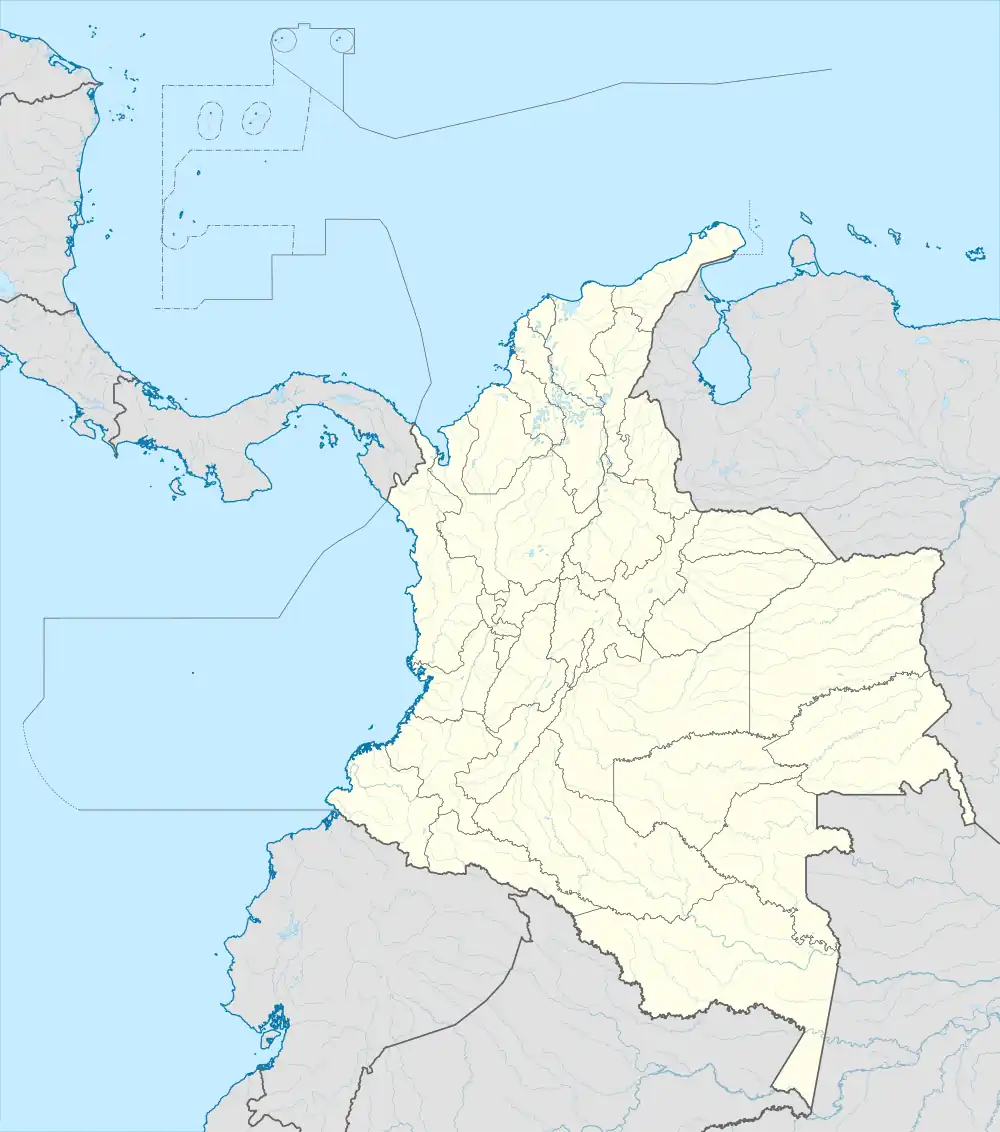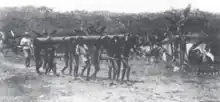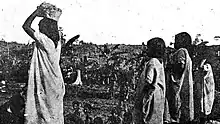La Chorrera, Colombia
La Chorrera is a town and municipality in the southern Colombian Department of Amazonas.[1] The population is largely engaged in agricultural production, hunting, fishing, and banana and cassava growing. The municipality was once a notable site for rubber production: exploited by the Peruvian Julio César Arana, who owned the Peruvian Amazon Company at the turn of the 20th century, north of the Putumayo River. The territory has an area of 12670 km².
La Chorrera | |
|---|---|
Municipality and town | |
 | |
 Location of the municipality and town of La Chorrera in the Amazonas Department of Colombia | |
 La Chorrera Location in Colombia | |
| Coordinates: 1°26′49″S 72°47′40″W | |
| Country | |
| Department | |
| Area | |
| • Total | 12,670 km2 (4,890 sq mi) |
| Climate | Af |
History

La Chorrera is located below a steep cataract of the Igaraparaná river. The settlement itself was built on a high bank of the over, and started off as a rubber planation. It was originally founded by Colombians Crisóstomo Hernandez & Benjamin Larrañaga around 1898 with the name ‘Colonia India’.[2] Originally the two were cinchona (quina) collectors, but switched their attention to rubber in the Putumayo after the collapse of the Cinchona boom. Julio Arana entered the region in 1896, soon forming a partnership with Benjamin and Rafael Larrañaga, forming Larrañaga, Arana y compañia.[3] For his future endeavors, Arana followed the example of the Colombians who had worked the local natives into a debt bondage system that would become synonymous with slavery. [4] One of the first well known crimes of the Putumayo genocide happened here in September of 1903. During the birthday of his sister in law, Rafael Larrañaga assisted by employees of the company, flogged, shot and killed 25 natives: burning some of the survivors alive. These victims were guilty of not gathering enough rubber to meet a quota.[5] After Benjamin Larrañaga's death on December 21st, 1903 Arana bought out Larrañaga's sons share from the comapny: "taking advantage of their ignorance and stupidity to rob them scandalously."[6] By this time, Julio C. Arana was in control over the Igaraparaná river: and after taking over El Encanto from the Calderón Hermanos, Arana was the sole master of the Putumayo. All rubber collected by Aranas firm along the Igaraparaná was sent to La Chorrera, where it was then sent to Iquitos. In 1906, the manager Victor Macedo issued an order "to kill all mutilated Indians at once for the following reasons: first, because they consumed food although they could not work; and second, because it looked bad to have these mutilated wretches running about."[7] Separation of families, slavery, constant flogging, target practice on humans, murders, various methods of torture, and the violation of little girls were common under the 'civilizing company.'


References
- García, Uriel Gonzalo Murcia; García, Claudia Milena Huertas; Rondón, Juan Manuel Rodríguez; Castellanos, Henry Omar Augusto (2011-12-14). Monitoreo de los bosques y otras coberturas de la Amazonia Colombiana, a escala 1:100.000 Cambios multitemporales en el período 2002 al 2007 (in Spanish). Instituto Amazónico de Investigaciones Científicas "SINCHI". ISBN 978-958-8317-70-0.
- Hardenburg, Walter (1912). The Putumayo, the Devil's Paradise; Travels in the Peruvian Amazon Region and an Account of the Atrocities Committed Upon the Indians Therein. Putumayo: London: Fischer Unwin. p. 295. ISBN 1372293019. Retrieved 29 June 2023.
- Valcárcel, Carlos (January 1, 1915). El proceso del Putumayo y sus secretos inauditos. Putumayo: University of Michigan Library. p. 22. Retrieved 29 June 2023.
- Hardenburg, Walter (1912). The Putumayo, the Devil's Paradise; Travels in the Peruvian Amazon Region and an Account of the Atrocities Committed Upon the Indians Therein. Putumayo: London: Fischer Unwin. p. 295. ISBN 1372293019. Retrieved 29 June 2023.
- Valcárcel, Carlos (January 1, 1915). El proceso del Putumayo y sus secretos inauditos. Putumayo: University of Michigan Library. p. 26. Retrieved 29 June 2023.
- Hardenburg, Walter (1912). The Putumayo, the Devil's Paradise; Travels in the Peruvian Amazon Region and an Account of the Atrocities Committed Upon the Indians Therein. Putumayo: London: Fischer Unwin. p. 295. ISBN 1372293019. Retrieved 29 June 2023.
- Hardenburg, Walter (1912). The Putumayo, the Devil's Paradise; Travels in the Peruvian Amazon Region and an Account of the Atrocities Committed Upon the Indians Therein. Putumayo: London: Fischer Unwin. p. 206. ISBN 1372293019. Retrieved 29 June 2023.
External links
- (in Spanish) Government of Amazonas Department; La Chorrera